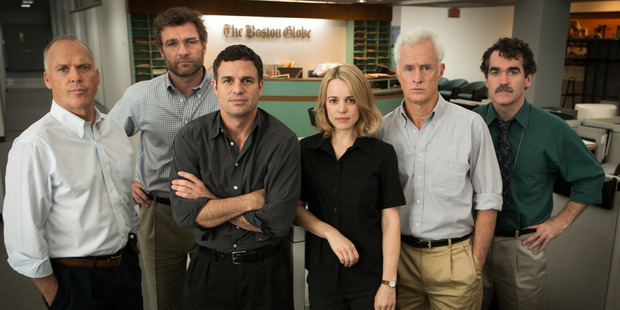Movie Review : Spotlight
By Peter Calder
Journalists are constantly exasperated by the depiction of journalism in the movies: crusading reporters who never take notes write their own (very bad) headlines for stories based on hunches, improbable disclosures, lucky breaks and dramatic confrontations. So among the many deeply satisfying aspects of this film, which stakes an early claim for a spot on the year's top-10 list, is that the reporters in it act like reporters. They make a lot of phone calls, take notes, wheedle and plead and doorstep: they use rulers to guide their line-by-line searches through directories and documents (the film is set in the internet's infancy); they drink a lot of bad coffee. The embedded idea - that most good journalism is unglamorous, hard-slog drudgery - may seem an unprepossessing concept for a film. But Spotlight enthralls because it remains so faithful to the facts, eschewing cheap theatrics and heroic mythmaking. Like the journos whose work it depicts, it never forgets that it's all about the story. That story drove a series of reports in the Boston Globe in 2002 after reporters of the title's investigative section had spent more than a year researching allegations of sexual abuse by the city's Catholic clergy. But rather than rush into print piecemeal, they kept digging, slowly uncovering a widespread pattern and a calculated and cynical coverup. The echoes of the Spotlight story have been - and continue to be -- heard around the world, of course, which is the reason director McCarthy (best known here for The Station Agent and The Visitor) shows such respect for history. His film starts, as the real story did, with the arrival of a new editor, Marty Baron (Schreiber). An outsider New Yorker - described by one character as "an unmarried man of the Jewish faith who hates baseball" - he brings fresh eyes to a city whose political and cultural life is saturated with Catholicism, and when he reads a column about a priest charged with abusing children, he wonders aloud whether there is more to it. The film deals fleetingly but tellingly with the almost unconscious corporate resistance to his suggestion and among the things the reporters dig up is evidence of their own past failures. This willingness to detail the paper's shortcomings, as well as its triumphs, lend the story credibility that money can't buy. Crucially, too, it avoids obvious flashbacks to scenes of creepy priests, although the brief sequences of witnesses have a visceral jolt ("How do you say no to God?" one man asks, trying to explain his compliance). Indeed, the confronted guilty parties are almost nonchalant ("Sure, I fooled around," one says. "But I never gratified myself.") and their superiors, who want to starve the story of oxygen, are chillingly reasonable about it all. In the end, it's an ensemble piece and the ensemble work is first-rate. Mike Rezendes (the always likeable Ruffalo), his head perpetually thrust forward like a dog straining at the leash; and Sacha Pfeiffer (resolutely unglamorous McAdams) are the stars but Matty Carroll (James) and boss Walter Robinson (Keaton), constantly fighting their corner in the corridors of management, are essential parts of the whole. Tucci, perhaps the most consistently enjoyable of American actors, is wonderful as a lawyer whose attention to the case moved beyond obsession into imprisonment, and Crudup as another lawyer is eerily plausible. This is an important film driven by a powerful, almost palpable, sense of moral urgency. It's also, not incidentally, an elegy for what newspapers used to be. Movie: Spotlight Cast: Liev Schreiber, Mark Ruffalo, Michael Keaton, Rachel McAdams, Brian d'Arcy James, Stanley Tucci, Billy Crudup Director: Tom McCarthy Running time: 128 mins Rating: M (offensive language, content that may disturb) Verdict: Potent, unsensational, honest and realistic
|
.
Any original material on these pages is copyright © BishopAccountability.org 2004. Reproduce freely with attribution.
